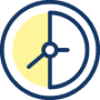
Auction Finance
Use it to buy or refinance property at speed

Auction Finance
Use it to buy or refinance property at speed
Loan Amount
£50k plus
Loan Term
Up to 3 years
Time to Funds
As Little as 7 days
Interest Rate
From 0.5% per month

Auction finance unlocks opportunities for property professionals
Buying a property at auction can be a great way to purchase property at a discounted rate, and auction finance enables you to take advantage of the opportunity.
Auction finance is designed specifically with auctions in mind, and typically this allows you to:
- Complete on the finance within a few weeks
- Borrow up to 75% of the property value
- Add interest costs to the loan
How to buy property at auction
Acquiring property at auction will more often than not give you the chance to find a property at below-market-value. Often there will be a motivated seller which is a real bonus.
The potential complication of buying at auction is that you will typically have to put down a deposit immediately. The balance will then need to be paid within a set time frame, usually 28 days. This is a far shorter time frame than you will encounter when buying property through more traditional mechanisms. This will then reduce the time you have to undertake your due diligence, complete the legal process and obtain finance.
However, auction finance is designed to take the stress out of funding the purchase. It will enable you to walk into the auction house with an agreement in principle in your back pocket. You will therefore know exactly how much you can bid and not have to worry about meeting the payment deadlines.
How does auction finance work?
In essence, auction finance works in much the same way as a bridging loan. It is a short-term financial solution that makes the money available for you to complete the purchase. As with bridging loans, the main thing the lender will want to see is that you have an exit strategy. In other words a way of repaying the money. This might be by refinancing the loan with a commercial mortgage. Or the plan may be to sell the property, for example.
Typically auction finance can run for 12 to 18 months to allow time to arrange an exit. However, you will want to arrange a refinance or the sale of the property as soon as possible to reduce the cost of borrowing. Bear in mind lenders often have a minimum term for an auction loan, typically 3 months.
Being a relatively short-term financial product, auction finance is something that is usually quick to set up. Many lenders offer an agreement in principle within a day or two of the application. Most are able to complete the finance within 2 to 4 weeks. The downside is that interest rates can be on the high side, so it is vitally important that you shop around. Using a comparison platform with access to multiple lenders can help you get the best possible deal.
Want some advice?
Talk to one of our Bridging Finance Specialists. We’re on hand to take you through the options available.
How much does auction finance cost?
Bridging finance is a short-term mechanism to raise significant funds quickly. So it will come as no surprise to know that interest rates are typically higher than a mortgage. Therefore it is important to shop around to get the best deal and using a broker is a great idea.
Some lenders will allow you to defer the interest payment till the end of the loan. This can be a real bonus if money is tight during the financing period.
You should typically expect to pay:
- Arrangement fee of around 2%
- Monthly interest rate between 0.5% - 1.5%
- A valuation fee
- Legal fees (both your legal fees and the lender's legal fees)
How do I buy a property at auction?
With the finance in place, all that is left is for you to go to the auction house and place your bid. If this is new territory for you, it makes sense to either use an experienced agent, or at the very least to carry out a “dry run” first, attending as a spectator to get a feel for the overall process.
With any significant purchase, it is vital to do your homework before making an offer. This holds doubly true when it comes to buying at auction. Carry out all the usual checks that you would when buying a property through an agent and view the property at least once.
If you need expert advice from a surveyor or building inspector, obtain it well in advance. Once you have placed your bid and the hammer has fallen, the property is yours. Therefore be 100 percent clear in advance about what it is you are buying.
Exiting bridging finance
The main thing that the lender will want to see is that you have an exit strategy in place. In other words, you need to show them how you are going to be able to repay it. Typically bridging finance is repaid by refinancing the loan, or by selling the property.
